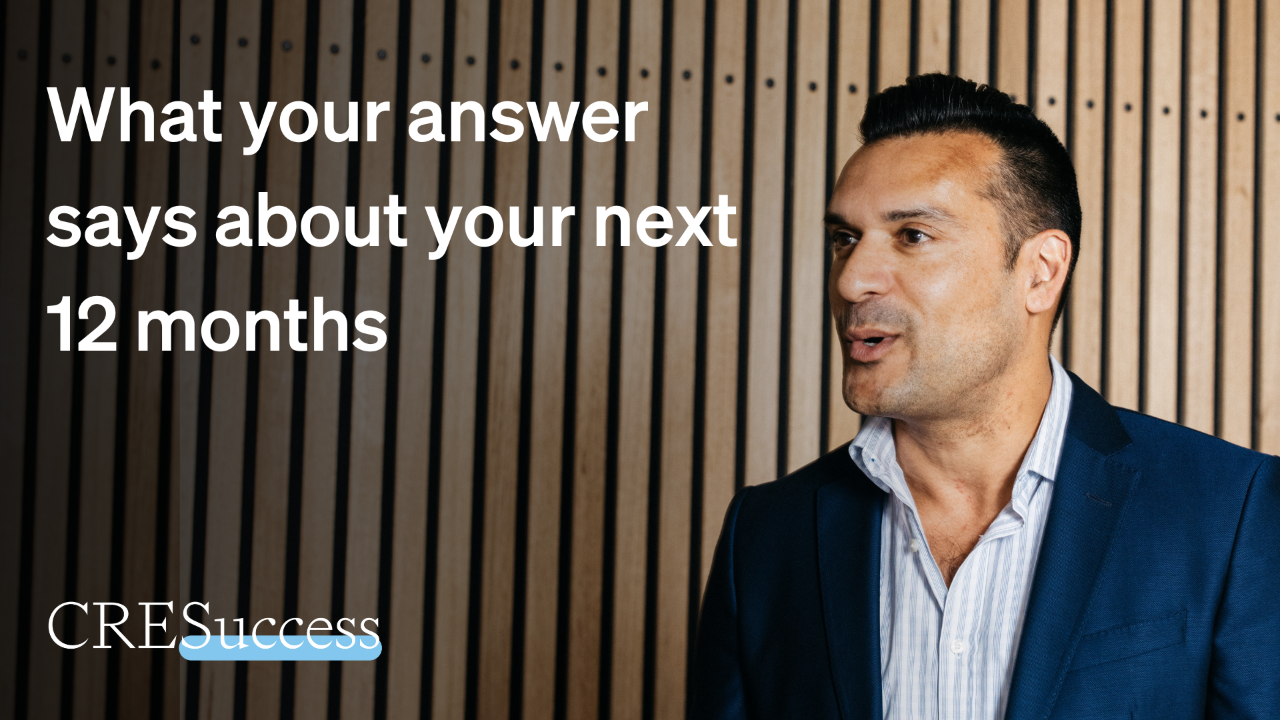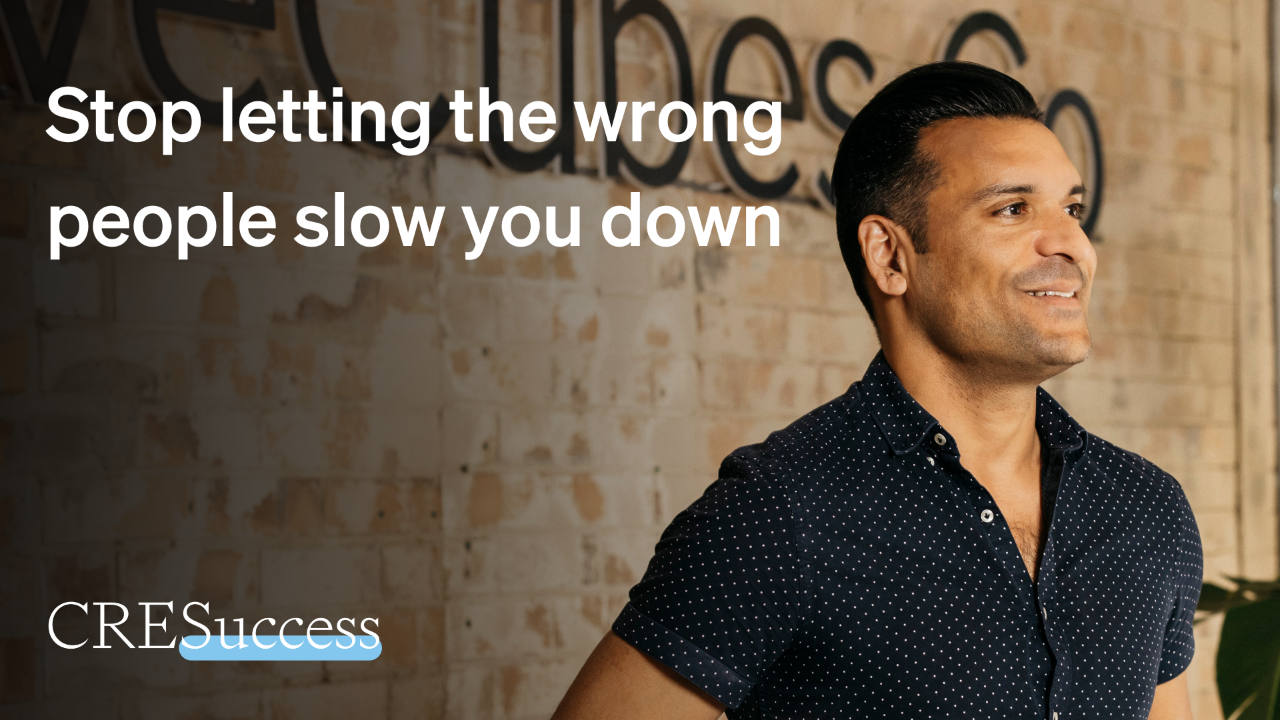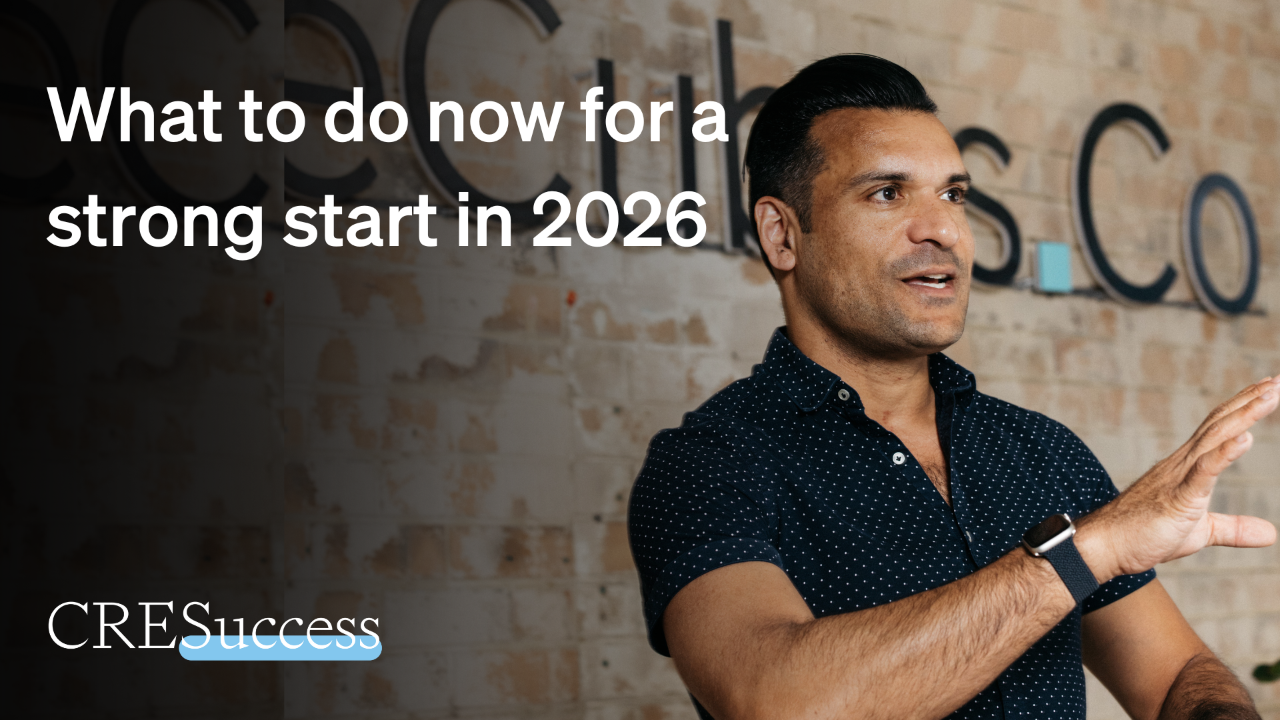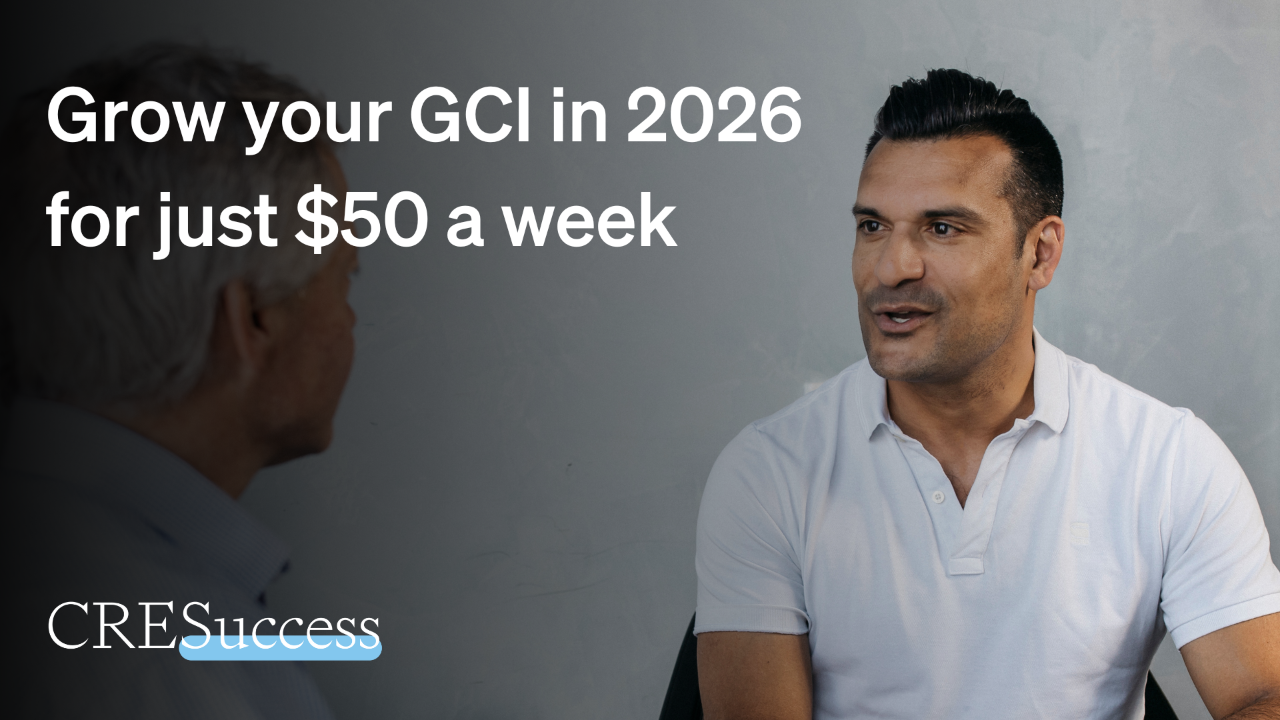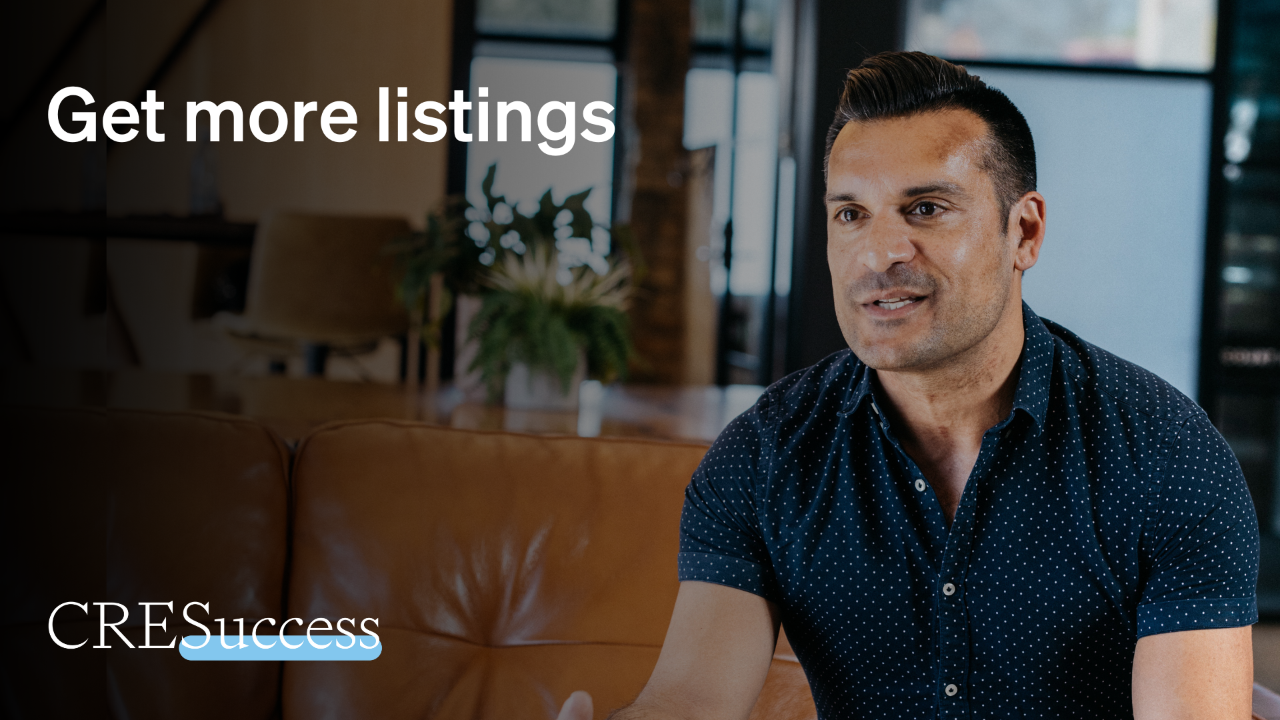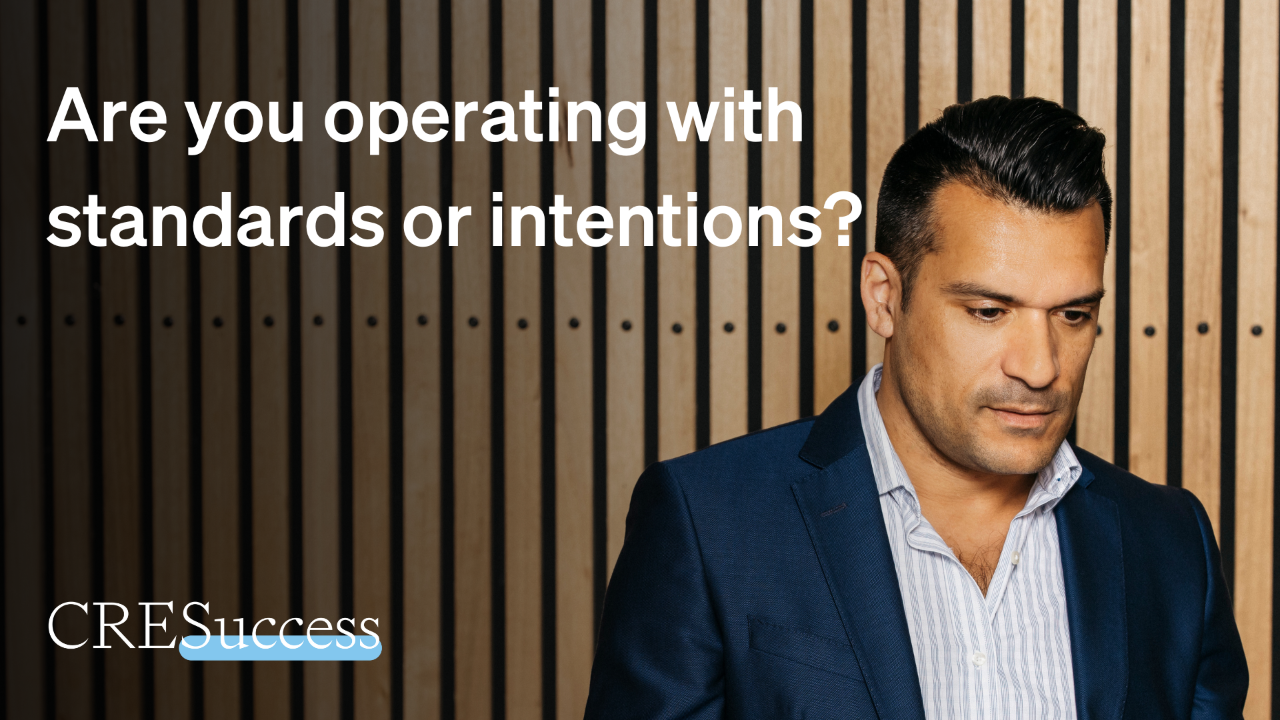Beliefs that are lies - why I pivoted my podcast after 50 episodes
Sep 02, 2021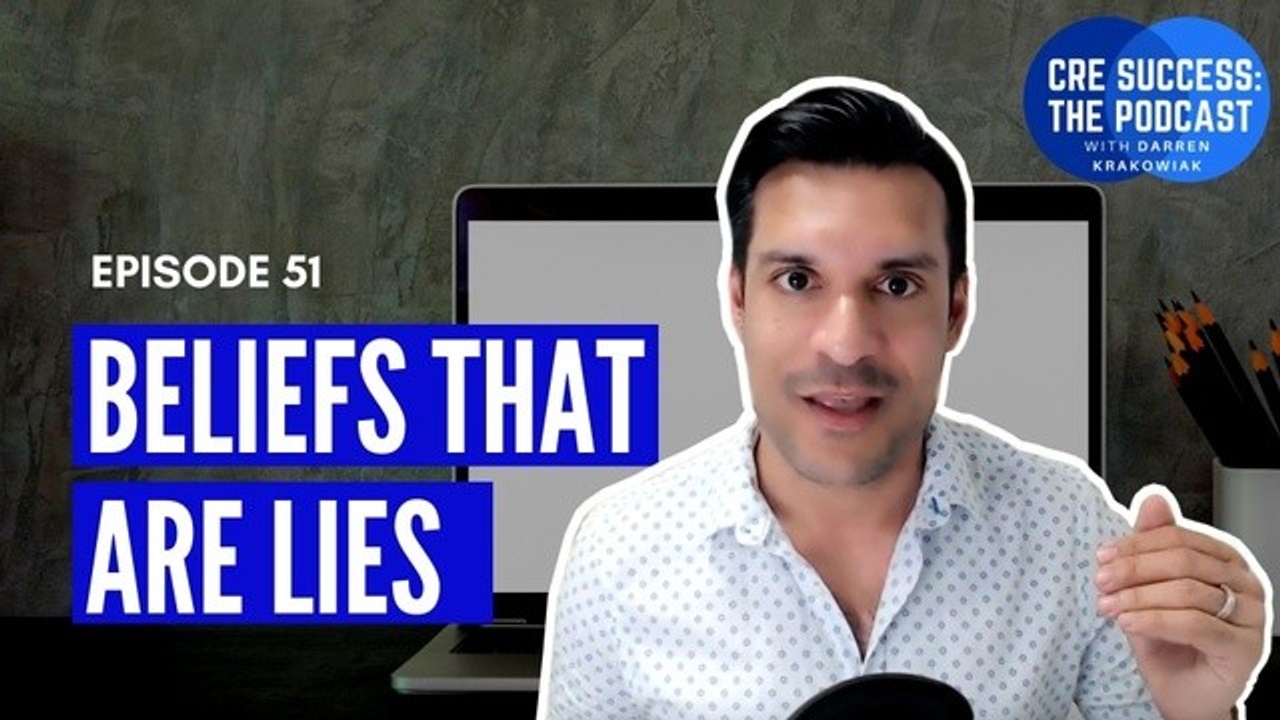
It's a good idea to set yourself new challenges.
It can stop you from getting stale or starting to just "phone it in".
Sometimes, even if it ain't broke, you can still set the bar higher or change it up, to keep things interesting (as opposed to "fix it").
After 50 episodes, I've evolved the format of CRE Success: The Podcast to
1. Record each episode live to video and stream the recording to LinkedIn and YouTube
2. Record each episode in one take - with no editing or post-production (apart from uploading the audio, which my VA does)
3. Switch the format from interviews - where I can rely on guests to contribute content - to being solely responsible for delivering content (i.e. kind of like a soliloquy!)
I also made these changes because I now realise that some of the beliefs I had about podcasts having to be done "a certain way" weren't accurate.
Many of the things we believe are lies.
In episode 51, I share some of what I learned from releasing 50 episodes of the podcast, and the rationale for some of the changes that are in place from episode 51 onwards.
Episode transcript:
On today's show, I'm going to be doing everything within my power to make it worth your while to stick around by sharing why some beliefs are lies.
And I'm going to be doing that in the context of the relaunch of CRE Success: The Podcast.
I'm going to share some things that I thought to be true, that aren't actually true that I've come to realize by releasing 50 episodes of this show.
Hello, and welcome to episode 51 of the show. My name is Darren Krakowiak. I equip commercial real estate professionals with proven client attraction and retention systems, so they can save time, earn more, and be top performers in their market.
It really is so great to have you here. Thank you for giving me your time.
Today's show is brought to you by Re-Leased. In 2020, Re-Leased launched CREDIA to provide market insights based on data from 10s of 1000s of commercial properties globally, to help customers better manage their businesses.
Now, before we launch into today's topic, I do want to invite you to the 'One thing'.
The 'One thing' is a workshop where I'm going to be talking about what makes top performers in commercial real estate the 'One thing' that does that.
And I've been promoting this workshop on LinkedIn, to my email list, and I've had people guess incorrectly that the 'One thing' is prospecting, or that it's how hard you work, or it's the quality of your personal brand.
That last one's getting closer to what it is. But none of those are correct. I will tell you exactly what it is.
I'll tell you why it matters. And I'll also be giving you some steps that you can take to immediately start applying this 'One thing', if you join me for the workshop on Thursday, September 9th.
It's happening at a time that's suitable for Australia, Asia Pacific more broadly, and also for North America.
But wherever you are in the world, you'll be able to find a time that works for you. Just go to cresuccess.co
On our homepage, you'll see three ones just under the main photo. Click on the time that works best for you. And I look forward to sharing what this 'One thing' is on September 9, which is one week from the release date of this show.
So, that to today's topic. And I released a podcast back in June 2020 for the first time.
And I had this belief that podcasts had to be done a certain way. I've done a lot of research to try and find out the best way to get it done.
And I guess I thought that for a start, I needed to release a podcast every week, at the same time.
And I think that's a good practice. And I am planning to continue doing that.
But that impacted the way that I did the numbering of the show. So, I thought that if I was going to take a break from releasing podcasts every week that I should start a new season.
So, I did two seasons. I did season 1, which was 20 episodes. And there was five bonus episodes in there plus approver episodes, so it was 26 all up.
And then I took a little bit of a break. And then I came back. And I did season 2, which started in April 2021. And did another 20 episodes along with four bonus episodes.
So, I've released 50 episodes, but I haven't been numbering them in that way. I've just been sort of going with seasons and number of episodes and bonus episodes.
And I've come to the realization that I don't have to do that. That it's perfectly fine for me just to release Episode 51, for example. And then next week, I do episode 52.
And then at the end of the year, if I decide to take a bit of a break over Christmas New Year, which at the moment, I think I might like to do that I can just come back in 2022 and call it episode, I guess it'll be something like 67 or 68 by the time we get to next year.
So, that was ‘one thing’ that I learned is that I don't have to follow numbering conventions just because I read in some article that that's the best way to do it. They shouldn't do it by seasons, for example.
Another thing that I've changed (and I'll explain why) is that I had thought that the interview format was the best way to create content because I was actually having guests who would help me fill content and provide content.
But also, I had the belief that people might not want to just listen to me speaking for 30 minutes. 30 minutes was the length of time that I committed to have as a maximum length for each episode.
And that was another belief I had, which was the people want to have an episode for that length.
Actually, that one sort of became true, it's going on a tangent here, because a lot of people like the fact that the episode doesn't prattle on for an hour or two.
Don't worry, I'm not planning on releasing an hour or two long episodes, if anything, we're going to go shorter from now on.
So, I'm thinking sort of 10-15 minute, almost bite sized episodes is where we're going.
But back to the guests and back to the length of the episodes, having interview format meant that it was actually a little bit harder, because I had to find guests.
And people don't always commit, or don't always follow through on their commitments to agree to do the shows.
You ask them to do the show, they say yes. And then you're going to chase them up a lot. And then you're going to get them to actually commit to a time and all of this. It's a lot of work.
And you know, the first season was all about interviewing experts from the industry.
The second season was more about interviewing subject matter experts who had expertise that would help people in our industry.
This time round from Episode 51, until they said, this 3rd season, we're just continuing on now. We're going to break these habits.
From now on, I'm going to try a new format, which is me speaking extemporaneously.
So, I'm developing a new skill. And I'm also I guess, positioning myself in a way that I can provide more of my expertise and more of my thoughts, as opposed to asking questions and receiving answers from the guest.
And I was able to provide some of my insight and opinion through the interview process, and also at the top and the tail of the episodes.
But this is an opportunity for me to learn a new skill. It's speaking continuously for a certain period of time.
It's creating, I guess, more of an opportunity for me to talk about things that I think are important, and I can have more control over the content that I'm putting out.
So, that's another reason why I've changed the format. It's to learn a new skill that is speaking extemporaneously. (I like that word; I've said it twice now, I won't say it again.)
But also, to allow me to have more strategic content, which sort of builds upon certain themes that I would like to talk about.
And I'm going to be talking a little bit about incorrect beliefs, and then better beliefs that I think can replace them as we go through the next few seasons.
In terms of learning new skills as well, one thing that I'm doing now is, and I won't be talking about this on future episodes, because I kind of think that, "Oh, I just spotted myself in a belief."
I kind of think that people who are listening on the podcast shouldn't be disrespected by me also referring to the fact that this is content that I'm also putting on to YouTube.
Maybe it doesn't matter as I belief, but I think I'm going to stick to that one.
But anyway, I'm telling you about it today. But then I'll just be recording video. And I will use the audio from this video as the podcast episode.
So, you'll have the option to watch it on YouTube. You previously had the opportunity to listen to the podcast on YouTube, but it was just an image that was provided by my podcast host that was automatically sent to YouTube.
I think, hopefully, this is more compelling content, me speaking to camera.
And I'm developing new skills. I'm speaking to camera. I'm releasing a podcast that's not edited.
I previously would edit the content and try and make it sound perfect, even though perfect is a very difficult thing to attain when it comes to, you know, a piece of content.
So, this new format gives me a lot of opportunities to do new things and learn new skills.
And also, I think it's going to be more efficient because I can release something on LinkedIn.
I'm going to release this video on LinkedIn, already mentioned YouTube, and of course, it becomes a podcast.
So, I'm creating more leverage, right? I'm doing ‘one thing’, and I'm doing it in one take. And it hopefully has the potential to travel further than the podcast did in the past.
Now it does mean that I've got to try and keep looking at this camera while I'm talking, rather than reading my notes down here. (You will see occasionally I’ll look at the notes)
Again, listening to the podcast that might impact you. Hopefully, it does mean that I'm a bit more in the flow and you'll get to hear a less sanitized version of what it is I have to say.
So, the overall thing I want to share in today's episode is that I was trying to fit into the mold of what I thought a podcast should be rather than allowing podcasts to be more malleable and fit into what I wanted to create.
So, podcasts are like most things in life. Flexible, they're not fixed.
And I think there's an opportunity for you to think about what it is that you've been having his beliefs in your mind.
And thinking about what is it that you can change that would result in you being more able to attract clients with greater ease?
When new business, when it's time to pitch, to deal with difficult colleagues, to handle clients when they're being demanding, what are some things that you can do in terms of changing the things that you've been telling yourself, and then tell yourself something new, that would make it easier for you to do those things?
And I learned this just last week. It's probably something I always knew, but someone told it to me last week, and it was like a light bulb went up in my head.
The word belief has the word lie in it. So, everything that you think in your mind is not necessarily true.
And if you question some of those beliefs and question the way that things have been done before, and you can find out the way doing something differently could be easier for you, well, I would say that, that is a win.
A couple of other things I wanted to share today, just before we go is about outsourcing as well.
So, one thing that I previously wasn't doing when I started up the podcast was outsourcing any of the post production.
I was doing it all myself. And that's kind of related to try to make it perfect.
But then, as we went through into season 2, I decided that I wanted to make the process easier, and I outsourced it.
And again, I had this idea in my mind that if I outsource, it wouldn't be as good in terms of the post production audio engineering than if I did it myself. And to be honest, I don't think it was as good.
But I let go of this belief that I've had to be perfect. And I created a lot more time for myself by letting go and allowing somebody else to produce it to.
Again, not the exact standard that I thought was perfect in my mind, but to a standard that was good enough.
And certainly, nobody asked me why had the podcast changed in terms of how it sounded, because I'm pretty sure nobody else, but me noticed.
So, what's the 'one thing' that you can shift in your mind that would help you in terms of the way that you go about work or life and just make things a little bit easier for yourself?
That's the 'one thing' that I want you to think about from today's episode.
I hope that me sharing with you a little bit about what I've learned from doing these first 50 episodes while I'm making some changes going forward helps you.
If you want to know about the 'One thing' that makes top performers in commercial real estate, I invite you to join me for the 'One thing' live and free workshop on Thursday, September 9th.
It's happening at the time for Asia Pacific for Australia, and also for North America. Go to cresuccess.co
On the homepage, you'll see some red ones that you can click and then register for that workshop.
If you are watching on YouTube or on LinkedIn, thank you for being there. You've got to be able to find this content every week in this place at this time.
And if you're listening to us on the podcast, I want to say thank you for being there as well. I will speak to you soon.


